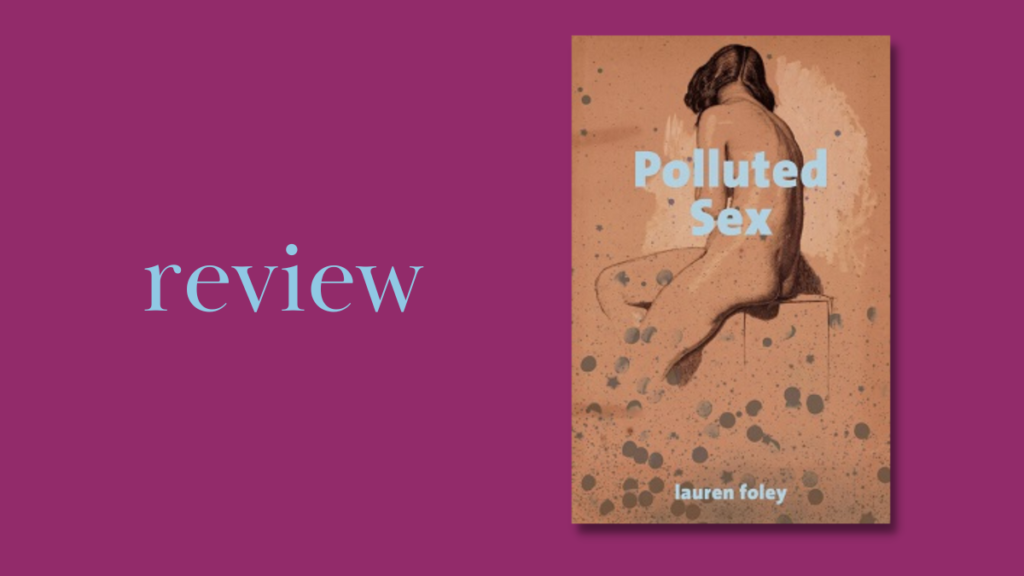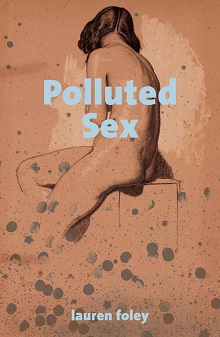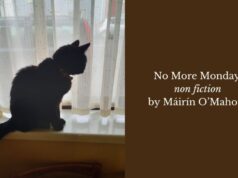
Polluted Sex|Lauren Foley|Influx Press|ISBN 9781910312919|€12.90
“An explicit, raw, and at times surreal portrait of girl and womanhood, discovered through sexual and bodily adventure and misadventure.”
—Fiona Murphy reviews Polluted Sex, by Lauren Foley
by Fiona Murphy
Upon flicking through the pages of Lauren Foley’s debut Polluted Sex (Influx Press), you’d be forgiven for doing a double take at the drawings, charts and even wrong-side-up pages that are scattered throughout the collection.
Experimental from page one, this interrogation of sex and relationships diverges in subject approach if not subject matter from the popular fiction route that young female authors have thrived on these last few years.
You’ll find no delicate and euphemistic language here that serves as a metaphor for the inner turmoil that comes with the new ‘coming-of-age’ age—your mid to late twenties.
Instead, you’ll find an explicit, raw, and at times surreal portrait of girl and womanhood, discovered through sexual and bodily adventure and misadventure.
Experimental
The collection of short stories is interspersed with scribbled notes in the margins, doodles, pictures, songs, plays and even portions that don’t technically fit the form of a play, but toy with the conventions to produce something totally absurdist and unique.
Like reading a diary in many ways, it’s this sort of experimentation with form and even reality that is the defining marker of this collection.
Foley switches between fonts and pens, with a seemingly endless repetition of words— sometimes for an entire page—and often leaves the reader discomfited. But perhaps the discomfort is the point.
Careful method
Rhythmic and pacing, the relentless repetition renders the text thronging, full and frantic, with an overflow of words and perspectives, switching from first to second person with dizzying speed.
It might seem careless at first glance but there is a careful method to this seemingly haphazard shifting.
We switch between points of view until we’re every woman in the story, having conversations both with each other and with ourselves; it’s not an arbitrary, self-conscious choice, but rather a deliberate and measured one.
Discovery
These stories entrap and ensnare with their complicated forms, and at their core are emotions and thoughts we all recognise: a naked woman stands centre stage in the exposing gaze of a spotlight; a child sings a nursery rhyme, but the lyrics become increasingly frightening and real; a pregnant woman agrees to have a blessing for motherhood, right before her pregnancy takes a horrifying turn.
Religion, desire and sin are laid bare and made strange in Foley’s succulent language that drips from the page like an overripe fruit, sweet but spoiling at the same time.
It might seem that there isn’t much order to the stories, but one can almost map a young woman’s discovery of herself and the transformations that take place over the course of a life.
Like the phases of the moon, we move with the various characters—who could easily all be the one woman—from sexual immaturity to sexual discovery to sexual maturity as they learn how to navigate their bodies like discoverers of continents.
Desire
One section features a series of fairytale-esque parables that explore sexual morality through Winona, a ‘Wicked Wanton Woman’ whose sexual greed leads her down a dark path.
Another section reads like spoken word poetry, vamping and ranting about everything from the Magdalene Laundries to clandestine bisexual relationships. There are also miniature plays dotted throughout the book tackling the suffering of motherhood, jealousy and possessiveness in new relationships, and handling your first sexual interactions.
But throughout those transformations and bodily phases, desire—and lack of it—play a huge role in these vignettes.
The words we use now to discuss sexual interactions and consent are deliberately rendered foreign to these girls who are forced into uncomfortable and dangerous situations through sheer silence. But their bodies speak loudly, in the pushing away of hands and re-buttoning of jeans.
Disquietening
The graphic and detailed sex scenes forensically examine the power exchanges in sexual acts, like how foreplay can become a power struggle for control, how the physical act of sex can sometimes overcome intellectual or even emotional reasoning.
Foley pushes the physical act to extremes until the narratives seem to descend to a point of depravity, obsession, infatuation with the body, ‘until she is raping herself’. Vulgar and often shocking, Foley employs disquieting language for these sexual encounters in a bid to unsettle the reader, and forces them to interrogate the feelings that come with this discomfort.
“You know the way lust shocks you? How you can want the body but not the man inside it?”
In short, going into this book with expectations is your first mistake. Moving with its flow and pulling at threads until you can see the entire tapestry emerge is the only way to weave your way through the complex but powerful art of Foley’s storytelling to uncover the motive behind the discomforting tales.













